It ain’t easy running the business side of Scottish football. At the heart of every senior club – from the affluent executive suites of Parkhead, Ibrox and Tynecastle to the pie stalls and community initiatives of Cappielow, Ochilview or Stark’s Park – there is a sense that every penny raised from commercial sponsorship is vital to continued success.
Scottish clubs cannot survive on TV money alone and two key areas of income – alcohol and gambling – are under closer scrutiny than ever before. Comparatively speaking, the Scottish game depends heavily on both. Its dependence on alcohol for commercial support is second only to that of Belgium among the top 10 European leagues. More than half of Scottish top clubs rely on both betting and booze for sponsorship, in some form.
“There is a reason companies pay for that. It is hugely visible in many ways. In Scotland it is hugely visible to saturation point really,” says Dr Richard Purves of the Institute for Social Marketing and Health at the University of Stirling. “It is common for these industries to say that marketing’s impact on people’s behaviour is simply about the brand. In other words, it is about persuading people who drink or gamble to switch to a particular brand; it isn’t about getting people addicted. This is incorrect – gambling operations make their money from people betting regularly, and in relatively large amounts.”
Purves and his colleagues have been researching consumer behaviour in relation to alcohol, gambling and other vices, for several years. Their studies arrive at a time when there is growing unease about how these various addictions affect people, especially in poorer communities.
Sponsors are no strangers to controversy. A generation ago it was not unusual for major sports to jump into deals with big tobacco companies. The idea that a leading cigarette brand might have its logo all over televised events may seem jarring now, but it was the norm during the peak snooker years of the 1980s.
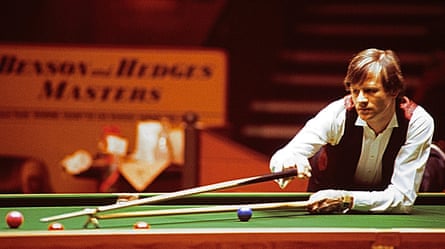
Alcohol proclaims its self-regulated approach, in the form of the Portman Group guidelines, which prohibit certain types of commercial activity related to sport. Its targets are to avoid overt promotion of drinking to vulnerable groups and especially the young. But the Portman measures have never represented a ban on advertising or sponsorship in the wake of tobacco.
Over recent years, the names on the shirts have changed. There are fewer alcohol-related shirt sponsors where recently there had been Tennent’s, Carling, Strongbow and Magners. To a large extent their names have been replaced by betting giants – Betfair, Dafabet and 32Red have all become better known via the game. In a pre-emptive strike, as the UK government moved towards announcing new proposals to restrict gambling promotion, the English Premier League has ruled that all gambling logos be removed from the front of clubs’ shirts by the 2026-27 season.
Other leagues and sports are now under pressure to follow suit. For several leading Scottish clubs, though, that would mean sacrificing lucrative shirt deals. In 2021, Rangers agreed a three-year extension to their shirt sponsorship deal with 32Red, believed to be worth £1.5m a year. In 2018, Celtic agreed a seven-year extension to its deal with Dafabet, described by the club as the biggest of its kind but with no figure disclosed. That expires at the end of the 2024-25 season.
Shirt sponsorship is a big deal in football, but it is by no means the only promotional channel open to the betting industry. Purves and his colleagues stress that, while shirt logos tend to be associated most closely with clubs, the visuals associated with TV are of more importance to sponsors. The whole experience of watching a match includes pitchside advertising, and the ads showing within the broadcast itself. “Consider just how saturated the visuals can be, and the impact that can have on individuals. All through a game you can see ‘live odds’, you can have Ray Winstone popping up to encourage a punt. It is difficult to avoid such content,” Purves says.
Gambling addiction can be devastating, leading to severe financial hardship, even bankruptcy, as well as job loss, relationship break-ups, mental breakdowns and even suicide. As Purves has noted, the worse off are the worst affected. Its defenders will say the misfortunes of the few should not prevent the majority from enjoying a flutter. Restricting gambling sponsorship or even banning it like tobacco would be using a sledgehammer to crack a nut. Plus, it would deprive Scottish football of vital income to fund stadium improvements, or new players, or whatever clubs need to improve their lot.
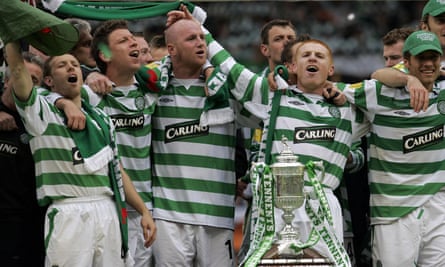
The boom in gambling sponsorship came quickly to football, ushered in by the liberalisation of rules in 2005. By the 2018-19 season more than half of all clubs in the English Premier League and Championship had gambling logos on their shirts. All four senior Scottish leagues and both major cup tournaments, as well as three of the four professional leagues in England, had gambling sponsors. A study of Match of the Day found that viewers were typically exposed to 250 instances of gambling marketing per episode, despite industry attempts at self-regulation.
The Premier League in England is moving towards stricter regulation. For Scotland to follow suit would provoke controversy among clubs in a league that is hardly renowned for collective unity in any case. Without English football’s rich cushion of broadcast income, it is more difficult north of the border.
Again, research into the influence of alcohol is telling. The team at Stirling recently examined alcohol-related sponsorship across 10 European leagues – including France and Norway, where it is banned. The research covered 178 clubs that shared more than 7,800 commercial partners or sponsors. Of these, 2.6% were engaged in alcohol production or distribution. The top three national leagues whose clubs had alcohol deals were Belgium (7.4%), Scotland (6.4%) and England (5.5%), significantly above the average.
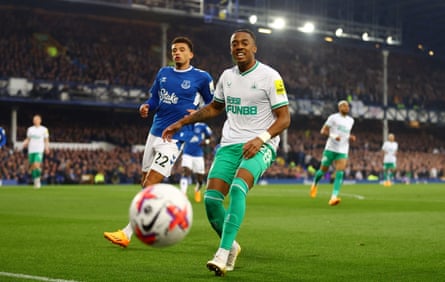
Purves points out that gambling promotion in the UK has enjoyed little or no regulation. In fact, the rules were liberalised underLabour, and the Conservatives have done little to change that since 2010. The gambling lobby is powerful in Westminster, something that has helped it escape stricter regulation – so far.
“Gambling in Britain does have a lack of regulation,” he says. “What barriers there are online are easy to bypass. There remains an element of the wild west since the creation of so many mobile and internet options. People might find a visit to a high street bookies quite daunting: online betting does away with that. Yet whenever the question is asked, there is public support for bans on sponsorship.”
There is certainly public interest. When the UK Culture Secretary announced a review of the 2005 Act, it received 16,000 submissions. This spring it unveiled a white paper that indicated plans to tighten up regulation of gambling promotion, and a shift towards firmer government oversight of the sector. Some proposals will face opposition in parliament as the gambling lobby seeks to limit such moves.
Culture secretary Lucy Frazer has estimated the number of people experiencing “problem gambling” – defined as gambling to a degree which compromises, disrupts, or damages family, personal or recreational pursuits – at 300,000, with a further 1.8 million identified as gambling at elevated levels of risk. Proportionately, that would suggest nearly 30,000 in Scotland in the “problem” bracket and more than 160,000 at elevated risk – very significant numbers in a small country whose major sport is replete with gambling promotion and suffers significant poverty.
The white paper is targeting online gambling in particular, with new proposals for financial checks on individuals who are losing more than £500, for example. Frazer reasons that, just as technology has made online gambling easy, so it might be used to track heavy users and identify those who are underage. The culture secretary wants the Gambling Commission and Advertising Standards Authority to concentrate on “smarter and safer” approaches.
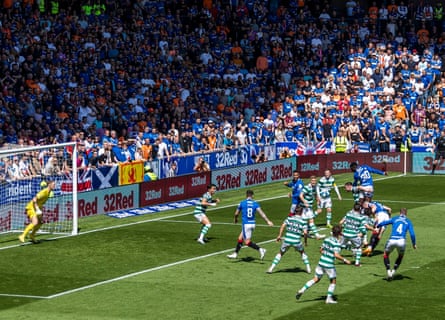
The Stirling University team’s research into gambling marketing shows just how ubiquitous it is in sports broadcasting. In 2018, researchers studied a typical viewing day of a football fan and found an astounding number of references to gambling brands. While watching Sky Sports, BT Sport and the BBC, they recorded the number of minutes during which brands appeared onscreen – on clothing, pitchside advertising and other sponsorship media.
The researchers studied five football matches, including one between Celtic and Rangers that kicked off at noon. In total, researchers recorded 2,595 gambling marketing references across the five games, an average of 519 per match. Harm reduction and age restriction messages appeared in just 3% of messages and were confined largely to TV ads.
In the case of the Rangers v Celtic clash, gambling marketing references appeared more frequently than anywhere else, at more than six times per minute, compared to West Ham v Manchester United (3.95 per minute) or Tottenham v Barcelona in the Champions League (0.11 per minute).
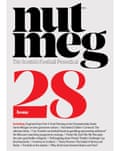
Stricter controls on gambling would be controversial in Scotland, especially to clubs who have earned significant sums since the rules were relaxed nearly two decades ago. Commercial managers will be under pressure to find alternatives. “Sponsors and marketing people always have to fill a void if something is banned or withdrawn,” Purves says. “One major argument against restriction is the impact of loss of income on the game. Yet France has a strict ban on alcohol. The Scandinavians have strict regulation of alcohol and gambling, in leagues such as Norway and Sweden, yet they all continue to thrive. They find other ways to earn money.”
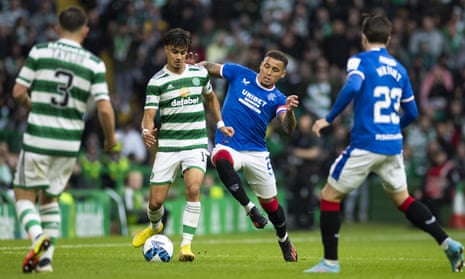
Comments (…)
Sign in or create your Guardian account to join the discussion